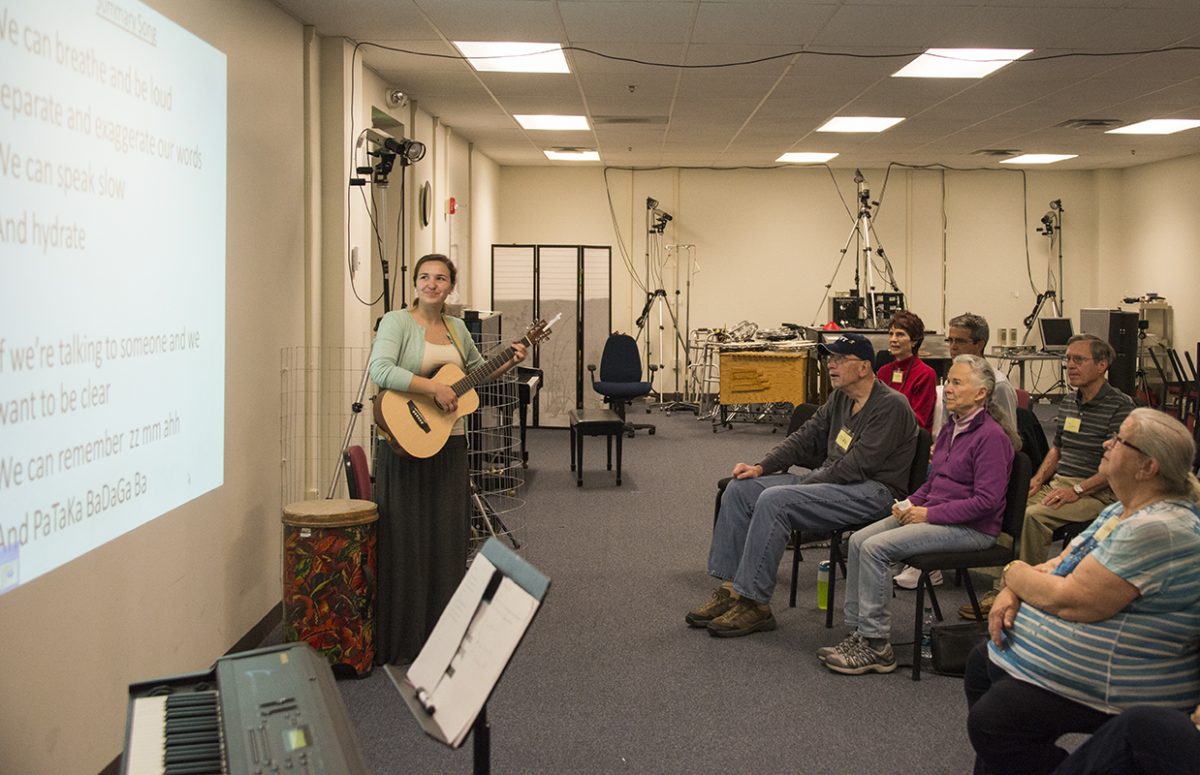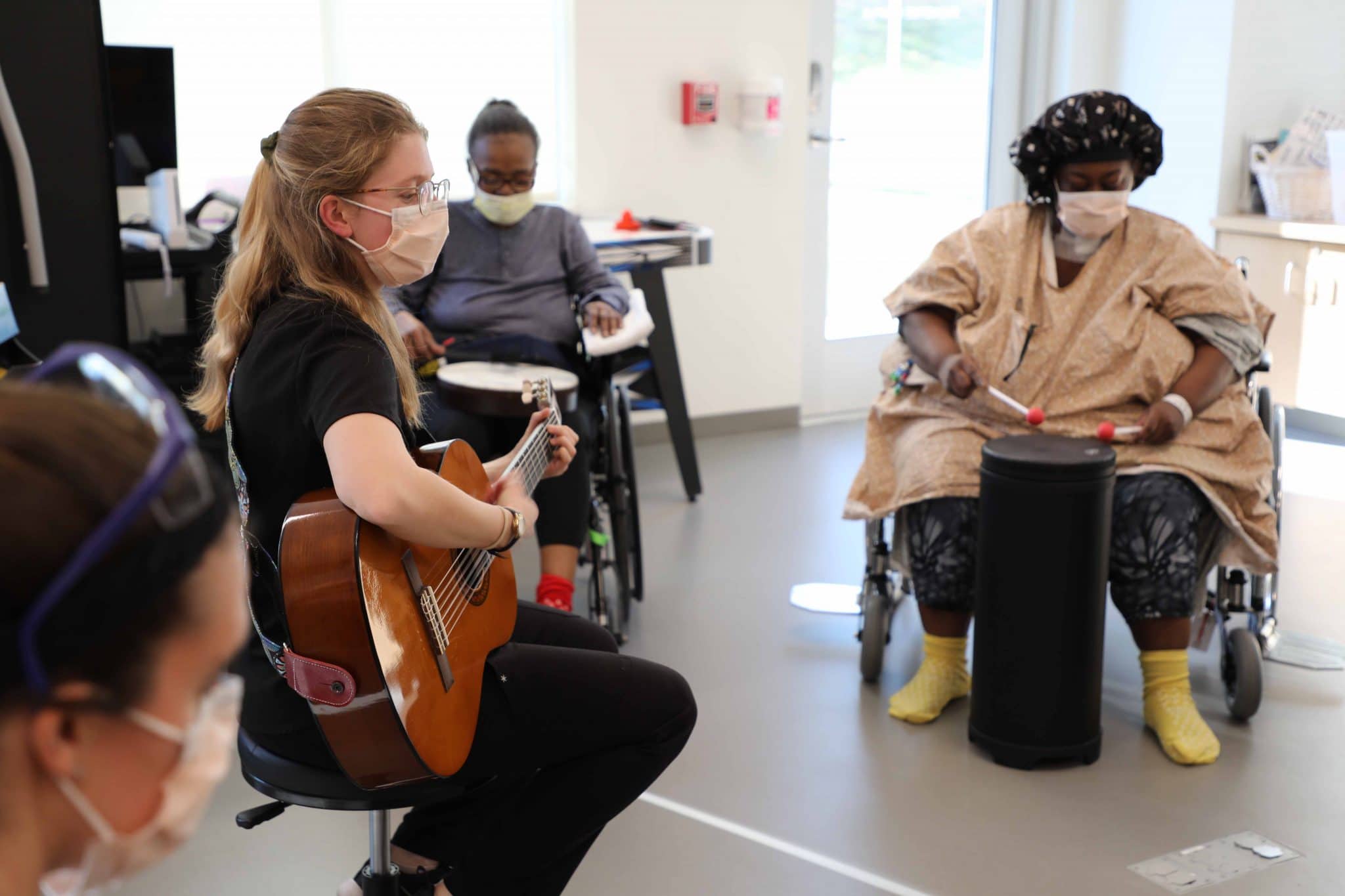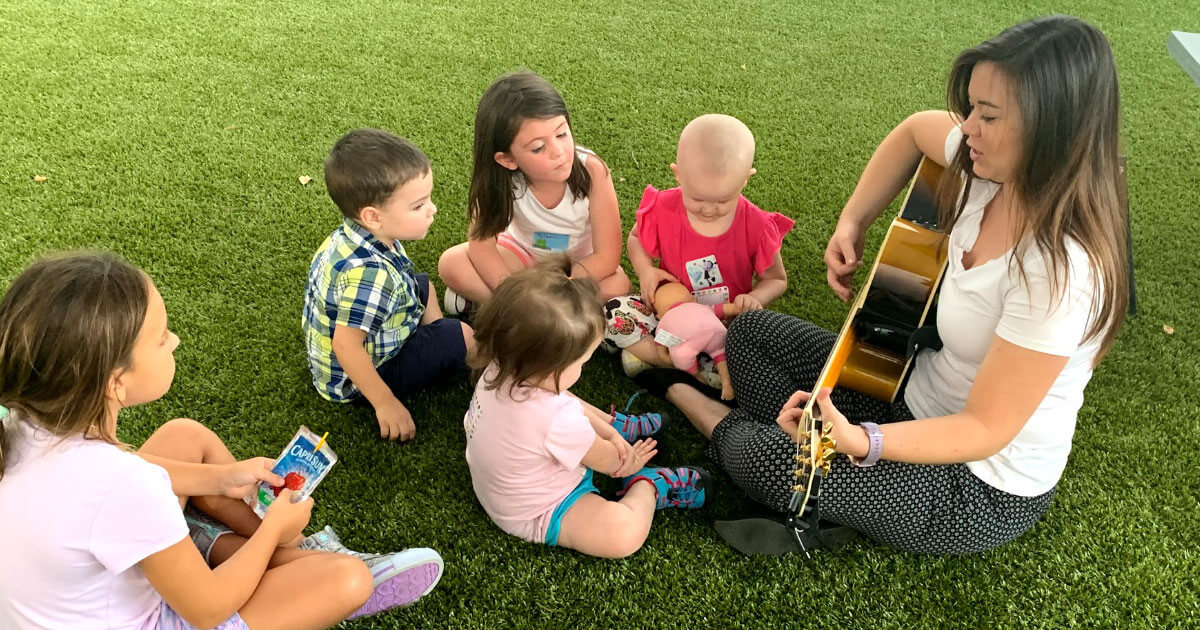Home>Events & Info>Music Therapy>What Courses Are Needed For A Music Therapy Degree


Music Therapy
What Courses Are Needed For A Music Therapy Degree
Modified: February 2, 2024
Explore the required courses for a music therapy degree and embark on a fulfilling career in using music to heal and support individuals.
(Many of the links in this article redirect to a specific reviewed product. Your purchase of these products through affiliate links helps to generate commission for AudioLover.com, at no extra cost. Learn more)
Table of Contents
- Introduction
- Overview of Music Therapy
- Importance and Benefits of Music Therapy
- Requirements for Obtaining a Music Therapy Degree
- Core Courses in Music Therapy
- Psychology and Human Development Courses
- Music Courses
- Clinical Training and Practicums
- Additional Elective Courses
- Professional Certification and Licensing
- Conclusion
Introduction
Music therapy is a specialized and growing field that utilizes the power of music to promote healing and improve the well-being of individuals. It combines the art of music with therapeutic techniques to address physical, emotional, cognitive, and social needs. As music has a profound impact on our emotions and can evoke memories, it offers a unique avenue for expression and communication.
In recent years, the field of music therapy has gained recognition for its effectiveness in treating various conditions such as autism, Alzheimer’s disease, depression, anxiety, and chronic pain. It is a holistic approach that considers the individual as a whole, incorporating elements of music theory, psychology, neuroscience, and counseling.
Music therapy can be applied in a variety of settings, including hospitals, rehabilitation centers, schools, mental health clinics, and private practice. A music therapist may work with individuals or groups, tailoring interventions to meet their specific needs and goals. The therapy sessions can include listening to music, playing musical instruments, singing, songwriting, movement to music, and improvisation.
If you have a passion for music and a desire to help others, pursuing a career in music therapy can be a rewarding choice. This article will provide an overview of the requirements for obtaining a music therapy degree, including the core courses, clinical training, and professional certification. Whether you are a student considering a degree in music therapy or someone interested in the field, this guide will give you a comprehensive understanding of the educational journey and the steps involved in becoming a music therapist.
Overview of Music Therapy
Music therapy is a discipline that uses music to address the emotional, physical, cognitive, and social needs of individuals. It is based on the belief that music is a powerful and universal language that can elicit responses and stimulate changes in individuals of all ages and abilities. Music therapists are trained professionals who utilize their knowledge of music and therapeutic techniques to create personalized interventions that meet the unique needs of their clients.
The field of music therapy dates back to the early 20th century when it was used to treat World War I veterans suffering from physical and emotional trauma. Since then, it has evolved and expanded to encompass a wide range of populations and settings. Music therapy can be beneficial for individuals with developmental disabilities, mental health disorders, neurological conditions, behavioral issues, and chronic illnesses.
Music therapists work collaboratively with their clients to establish goals and develop a treatment plan. They use various musical activities and techniques to facilitate therapeutic outcomes. These activities can include listening to music, playing instruments, singing, songwriting, improvisation, and movement to music. The choice of interventions is tailored to the specific needs and preferences of the client.
One of the unique aspects of music therapy is its ability to access and engage different areas of the brain. Music stimulates the brain’s reward system, releases neurotransmitters like dopamine, and can modulate emotions and memories. This makes it a powerful tool for emotional expression, stress reduction, and cognitive enhancement.
Music therapy sessions can be conducted on an individual basis or in a group setting. Group sessions provide opportunities for social interaction, peer support, and skill development. They can also foster a sense of belonging and create a supportive community. Individual sessions, on the other hand, allow for a more focused and personalized approach to address specific therapeutic goals.
Overall, music therapy aims to improve the quality of life and promote well-being for individuals through the power of music. It can enhance self-awareness and expression, develop communication and social skills, reduce anxiety and depression, manage pain, improve cognitive functions, and increase overall emotional and physical well-being.
Importance and Benefits of Music Therapy
Music therapy offers a wide range of benefits for individuals of all ages and abilities. It can have a positive impact on physical, emotional, cognitive, and social well-being. Here are some of the key importance and benefits of music therapy:
- Emotional expression and regulation: Music provides a safe and non-verbal outlet for individuals to express and process their emotions. It can help individuals explore and navigate complex emotions, manage stress, and regulate mood.
- Reduces anxiety and depression: Engaging in music therapy activities, such as listening to calming music or participating in group drumming sessions, can significantly reduce symptoms of anxiety and depression. Music has the power to elevate mood, increase positive emotions, and provide a sense of comfort and relaxation.
- Enhances cognitive functioning: Music therapy can improve cognitive skills such as attention, memory, and problem-solving. When individuals engage in playing instruments or singing, it activates various brain regions and stimulates neural pathways, leading to enhanced cognitive abilities.
- Promotes physical rehabilitation: Music therapy can assist in physical rehabilitation by enhancing motor skills, coordination, and movement. Rhythmic auditory stimulation in music can help with gait training and facilitate greater mobility for individuals with physical disabilities.
- Boosts social interaction and communication skills: Group music therapy sessions create opportunities for social interaction, fostering a sense of belonging and community. Through collaborative music-making, individuals develop communication skills, turn-taking, and learn to work as a team.
- Supports individuals with developmental disabilities: Music therapy has been found to be particularly effective for individuals with developmental disabilities. It can improve speech and language skills, social engagement, and sensory integration.
- Alleviates pain and promotes relaxation: Music has been shown to have analgesic effects, reducing pain perception and increasing pain tolerance. It can also induce a state of deep relaxation, aiding in stress reduction and promoting overall well-being.
- Increases self-esteem and self-confidence: Successful music experiences and accomplishments in therapy can boost self-esteem and self-confidence. Mastering an instrument or performing in a group can instill a sense of accomplishment and self-worth.
- Provides support during end-of-life care: Music therapy can offer comfort, peace, and emotional support for individuals receiving end-of-life care. It can bring solace, ease feelings of loneliness, and facilitate meaningful connections with loved ones.
These are just a few examples of the profound importance and benefits of music therapy. The power of music to heal, connect, and uplift individuals is well-documented and continues to be a driving force behind the growing recognition of music therapy as a valuable therapeutic modality.
Requirements for Obtaining a Music Therapy Degree
If you are interested in pursuing a career in music therapy, there are several requirements you’ll need to fulfill to obtain a music therapy degree. These requirements typically include a combination of academic coursework, clinical training, and professional certification. Here are the key components of obtaining a music therapy degree:
- Undergraduate Education: To become a music therapist, you’ll need to complete a bachelor’s degree in music therapy from a program accredited by the American Music Therapy Association (AMTA). The undergraduate coursework typically includes courses in music theory, music history, psychology, anatomy and physiology, and therapeutic techniques. It is important to select a program that integrates both music and therapy content.
- Clinical Training: Alongside the academic coursework, you’ll be required to complete a certain number of clinical training hours. These clinical hours provide hands-on experience under the supervision of a certified music therapist. It allows you to apply the knowledge and skills learned in the classroom to real-life therapeutic settings. Clinical training may take place in a variety of healthcare facilities or educational institutions.
- Practicums and Internships: Many music therapy programs also require students to complete practicum experiences and internships. These supervised placements allow students to gain practical experience and further develop their clinical skills. Practicums and internships may vary in length and can be completed in different settings, such as hospitals, schools, or community organizations.
- Senior Capstone Project: In some music therapy programs, students are required to complete a senior capstone project. This project typically involves conducting a research study or developing and implementing a special therapeutic program. The capstone project allows students to showcase their knowledge and skills while making a meaningful contribution to the field of music therapy.
- Professional Certification: Upon completing the required coursework and clinical training, you will need to apply for professional certification through the Certification Board for Music Therapists (CBMT). The certification exam evaluates your competence in the field and covers areas such as music therapy assessment, treatment planning, implementation, and evaluation. After passing the exam, you will earn the credential of Music Therapist Board Certified (MT-BC).
- Continuing Education: To maintain your professional certification, you’ll need to engage in ongoing professional development through continuing education. This involves attending workshops, conferences, and seminars, as well as participating in online courses and webinars. Continuing education ensures that you stay current with advancements in the field and enhances your skills and knowledge as a music therapist.
It is important to check the specific requirements of the music therapy program you plan to pursue, as they may vary from one institution to another. It is also recommended to connect with practicing music therapists or academic advisors to get further guidance and insights into the requirements and steps needed to obtain a music therapy degree.
By completing the necessary coursework, clinical training, and certification, you will be equipped with the knowledge and skills needed to embark on a fulfilling career as a music therapist. The journey to becoming a music therapist is both challenging and rewarding, as you have the opportunity to make a positive impact on the lives of individuals through the power of music.
Core Courses in Music Therapy
Core courses in music therapy are designed to provide students with a solid foundation in both music theory and therapy principles. These courses are essential in developing the necessary knowledge and skills to become a competent music therapist. Here are some of the key core courses typically found in music therapy degree programs:
- Music Theory and Composition: This course covers the fundamental principles of music theory, including notation, scales, chords, harmony, and rhythm. Students learn to analyze music and apply theoretical concepts in their clinical practice.
- Music Therapy Techniques and Methods: In this course, students explore various music therapy techniques and interventions used in clinical settings. They learn about improvisation, songwriting, lyric analysis, receptive listening, and other therapeutic approaches. The course emphasizes the application of these techniques with different populations and goals.
- Psychology of Music: This course delves into the psychological aspects of music, exploring how music affects emotions, cognition, and behavior. Students study the theories and research related to the psychology of music and understand how music can be used therapeutically to facilitate positive change.
- Musical Development and Adapted Lessons: This course focuses on understanding the musical development process and how to adapt music lessons to individuals with diverse needs and abilities. Students learn strategies for adapting music instruction to accommodate physical, cognitive, and sensory limitations.
- Clinical Assessment and Documentation: This course teaches students how to conduct assessments, set goals, and document progress in music therapy sessions. Students learn various assessment tools and techniques used to evaluate clients’ functioning and track their therapeutic progress.
- Ethics and Professional Issues in Music Therapy: This course explores ethical considerations and professional standards specific to the field of music therapy. Students learn about informed consent, confidentiality, boundaries, cultural competence, and professional responsibilities as a music therapist.
- Musical Improvisation: This course focuses on the art of musical improvisation, teaching students how to spontaneously create music in a therapeutic setting. Students explore different improvisation techniques, develop their improvisational skills, and learn how to facilitate improvisation with clients.
- Music and Health: This course examines the relationship between music and health, exploring the physiological, psychological, and social effects of music on well-being. Students learn about the research on music and its therapeutic applications in promoting health and wellness.
This is just a sampling of the core courses commonly found in music therapy degree programs. The specific courses may vary depending on the program and institution. Additionally, some programs may offer specialized courses or electives that focus on specific populations or areas of expertise within music therapy.
By completing these core courses, students gain a comprehensive understanding of music theory, therapeutic techniques, assessment skills, ethical considerations, and the therapeutic application of music. These courses lay the foundation for a successful career in music therapy and provide students with the knowledge and skills necessary to make a meaningful impact using the power of music.
Psychology and Human Development Courses
Psychology and human development courses are an essential component of a music therapy degree program. These courses provide students with a deep understanding of human behavior, cognitive processes, and the development of individuals across the lifespan. The knowledge gained from these courses is crucial for music therapists to effectively assess, understand, and tailor their interventions to the unique needs of their clients. Here are some of the key psychology and human development courses commonly included in music therapy programs:
- Abnormal Psychology: This course explores various psychopathologies, including mood disorders, anxiety disorders, personality disorders, and neurodevelopmental disorders. Students learn how to recognize and understand the symptoms and manifestations of these conditions, which is essential for providing appropriate therapeutic interventions.
- Developmental Psychology: This course examines the physical, cognitive, social, and emotional development of individuals across the lifespan. Students learn about the major theories of development and how they apply to different age groups – from infancy to late adulthood. Understanding developmental milestones and challenges helps music therapists gauge their clients’ needs and design appropriate interventions.
- Cognitive Psychology: This course focuses on the study of human cognition – how people acquire, process, and use knowledge and information. Students learn about memory, attention, perception, language, problem-solving, and decision-making. The knowledge gained from this course helps music therapists understand how music can engage cognitive processes and how it can be used to enhance cognitive functioning.
- Social Psychology: This course explores how social interactions, relationships, and cultural factors influence human behavior. Students learn about social cognition, attitudes, conformity, group dynamics, and the impact of social context on individuals. This knowledge is valuable for music therapists in understanding how music can foster social interaction, improve communication, and facilitate group dynamics during therapy sessions.
- Theories of Personality: This course introduces students to the major theories and perspectives on personality development. Students learn about different personality traits, psychodynamic theories, behavioral theories, and humanistic theories. Understanding personality dynamics helps music therapists build rapport, tailor interventions to individual personalities, and address clients’ unique needs.
- Child and Adolescent Development: This course focuses specifically on the physical, cognitive, social, and emotional development of children and adolescents. Students learn about the challenges and milestones faced during this critical period of life. This knowledge is crucial for music therapists working with children and adolescents, as it helps them design age-appropriate interventions and create a therapeutic environment that supports their developmental needs.
- Gerontology: This course specifically addresses the physical, cognitive, and psychosocial aspects of aging. Students learn about the challenges faced by older adults and how to provide effective therapeutic interventions to promote their well-being. Understanding the unique needs and issues related to aging is essential for music therapists working with older adults.
- Group Dynamics: This course focuses on the dynamics of group behavior and how individuals interact within a group setting. Students learn about group formation, communication patterns, leadership, conflict resolution, and the roles individuals play in groups. This knowledge is valuable for music therapists leading group music therapy sessions, as it helps them facilitate a supportive and cohesive group environment.
These psychology and human development courses provide music therapy students with a comprehensive understanding of human behavior, cognition, and development. By integrating these concepts into their practice, music therapists can better assess their clients’ needs, develop appropriate treatment plans, and facilitate positive change through music therapy interventions.
Music Courses
Music courses play a central role in a music therapy degree program. These courses provide students with a strong foundation in music theory, performance, and composition. By honing their musical skills and knowledge, music therapists are equipped to effectively incorporate music into their therapeutic interventions. Here are some of the key music courses typically included in a music therapy program:
- Music Theory: This course covers the fundamental principles of music theory, including notation, scales, chords, harmony, and rhythm. Students learn how to analyze and understand written music, which is crucial for composing and arranging music for therapeutic purposes.
- Musicianship: This course focuses on developing essential musicianship skills, such as ear training, sight-reading, and music dictation. Students improve their abilities to listen to and interpret music, which is fundamental for effective music therapy practice.
- Instrumental Studies: Music therapy students typically learn to play at least one primary instrument. This course allows students to develop proficiency on their chosen instrument and explore different playing techniques and styles. Learning an instrument enables music therapists to actively engage in music-making during therapy sessions.
- Vocal Studies: In addition to instrumental studies, vocal studies are an integral part of music therapy training. Students learn proper vocal techniques, breath control, and voice projection. Developing vocal skills enables music therapists to incorporate singing and vocal exercises into their therapeutic interventions.
- Music History: This course provides an overview of the history of Western music, from ancient times to the present. Students learn about the major composers, musical movements, and styles throughout different historical periods. Understanding the historical context of music helps music therapists select appropriate music and adapt their interventions to different client populations.
- Composition and Arrangement: This course focuses on composing and arranging music for therapeutic purposes. Students learn how to create original compositions and adapt existing music to fit the needs of their clients. Composition and arrangement skills allow music therapists to personalize their interventions and tailor them to address specific therapeutic goals.
- Improvisation: Improvisation is a key component of music therapy practice. In this course, students learn how to improvise and create music in the moment. They explore various improvisation techniques, such as melodic improvisation, rhythmic improvisation, and harmonic improvisation. Improvisation skills enable music therapists to spontaneously respond to clients’ needs and foster creative expression.
- Musical Styles and Cultures: This course explores music from different cultures and genres. Students learn about the diverse musical styles and traditions around the world. Understanding different musical styles and cultures helps music therapists incorporate culturally relevant and inclusive music into their practice.
These music courses provide music therapy students with a comprehensive musical foundation that they can draw upon when working with clients. By developing their musical skills and knowledge, music therapists are better equipped to utilize music as a therapeutic tool and connect with their clients on a deeper level. The integration of music courses with the principles of therapy creates a unique and powerful approach to healing and promoting well-being through music therapy.
Clinical Training and Practicums
Clinical training and practicums are vital components of a music therapy degree program. They provide students with hands-on experience in real-life therapeutic settings, allowing them to apply their knowledge and skills in a supervised and supportive environment. Clinical training and practicums serve as a bridge between classroom learning and professional practice. Here is an overview of the clinical training and practicum experiences typically included in a music therapy program:
Clinical training and practicums:
- Scheduled Clinical Hours: Many music therapy programs require students to complete a certain number of clinical hours as part of their degree requirements. These scheduled clinical hours are usually spent in various healthcare facilities, educational institutions, or community settings where music therapy services are provided. Students observe and actively participate in music therapy sessions under the supervision of a certified music therapist.
- Individual Supervision: During clinical training and practicums, students receive individual supervision from a certified music therapist. These supervision sessions provide an opportunity for students to discuss and reflect on their clinical experiences, receive feedback and guidance, and further develop their clinical skills. Supervision helps students integrate theoretical knowledge with practical application and ensures the delivery of ethical and effective music therapy services.
- Group Supervision: In addition to individual supervision, group supervision may be conducted where students come together to discuss their clinical experiences, share insights, and learn from each other. Group supervision fosters a supportive learning environment, encourages collaboration, and offers additional perspectives on therapeutic approaches and interventions.
- Practicum Experiences: Many music therapy programs require students to complete practicum experiences. Practicums are supervised placements in which students work directly with clients under the guidance of a certified music therapist. Practicums allow students to gain practical experience in designing and implementing music therapy interventions, assessing client needs, documenting progress, and building therapeutic relationships. These experiences often include working with diverse populations, such as children, adolescents, adults, and older adults, in various clinical or community settings.
- Internships: Some music therapy programs may also require students to complete an internship. Internships typically involve a more intensive and extended period of clinical training, lasting several months to a year. During internships, students may rotate through different clinical settings, gain experience in specific areas of music therapy practice, and work with a variety of populations. Internships provide students with an immersive and comprehensive learning experience, preparing them for professional practice.
The clinical training and practicum experiences offered in music therapy programs are designed to help students develop clinical competence, refine their therapeutic skills, and gain confidence in their ability to provide effective music therapy services. These experiences also provide invaluable opportunities for students to learn firsthand about the challenges and rewards of working as a music therapist.
It is important to note that clinical training and practicums provide a supervised learning experience, ensuring the safety and well-being of both the student and the client. These experiences adhere to ethical guidelines and professional standards set forth by the American Music Therapy Association (AMTA) and the Certification Board for Music Therapists (CBMT).
By actively participating in clinical training and practicums, music therapy students gain the practical knowledge and skills necessary to excel as competent and compassionate music therapists. These hands-on experiences pave the way for a successful career in using music as a powerful tool for healing and promoting well-being.
Additional Elective Courses
In addition to the core music therapy and psychology courses, many music therapy degree programs offer a variety of elective courses. These elective courses allow students to further specialize in specific areas of interest within the field of music therapy. Elective courses provide an opportunity for students to deepen their knowledge, develop specialized skills, and explore specific populations or therapeutic approaches. Here are some examples of additional elective courses that students may have the option to take:
- Music and Autism: This elective course focuses on understanding autism spectrum disorder (ASD) and exploring how music can be used as an effective intervention for individuals with ASD. Students learn about the unique characteristics of individuals with ASD and how to design music therapy interventions that address their specific needs and promote social, emotional, and communication skills.
- Music Therapy with Older Adults: This elective course delves into the specific needs and considerations when working with older adults in music therapy. Students learn about the physical, cognitive, and psychosocial changes that occur with aging and how music therapy can enhance quality of life, memory, and overall well-being in older adults.
- Music Therapy in Mental Health: This elective course explores the applications of music therapy within the field of mental health. Students learn about various mental health disorders, therapeutic approaches, and interventions using music to address emotional regulation, self-expression, and socialization in individuals with mental health concerns.
- Music Therapy in Education: This elective course focuses on the use of music therapy in educational settings. Students learn how to apply music therapy techniques and interventions to enhance learning, promote academic skills, and support the social-emotional development of students in schools and classrooms.
- Music Therapy and Trauma: This elective course examines the effects of trauma on individuals and explores the role of music therapy in trauma recovery. Students learn trauma-informed music therapy techniques and interventions to support individuals in processing trauma, reducing symptoms, and promoting healing.
- Music Therapy and Palliative Care: This elective course focuses on the use of music therapy in palliative and end-of-life care settings. Students learn how music therapy can provide comfort, emotional support, and pain management for individuals facing life-limiting illnesses and their families.
- Music Therapy and Addiction: This elective course addresses the role of music therapy in supporting individuals with addiction. Students learn about addiction theories, treatment modalities, and how music therapy can be integrated into addiction recovery programs to foster self-expression, emotional regulation, and overall well-being.
- Creative Arts Therapies Integration: This elective course explores the integration of different creative arts therapies, such as art therapy, dance/movement therapy, drama therapy, and music therapy. Students learn how to collaborate with practitioners from other disciplines and incorporate multiple creative modalities into their music therapy practice.
These elective courses allow students to delve deeper into specific areas of interest and gain specialized knowledge and skills. They provide an opportunity to broaden the scope of practice and create a more well-rounded approach to music therapy. Students can select electives based on their career goals, personal passions, and the populations they aspire to work with in their professional practice.
It is important to note that the availability of elective courses may vary among different music therapy programs. Students are encouraged to consult with academic advisors or faculty members to determine which elective courses are offered within their program and align with their interests and goals.
By taking additional elective courses, students can expand their repertoire of therapeutic skills, gain in-depth knowledge in specific areas of music therapy, and enhance their expertise in serving diverse populations. These courses provide valuable opportunities for growth, specialization, and further exploration within the field of music therapy.
Professional Certification and Licensing
Obtaining professional certification and licensing is a crucial step towards becoming a qualified and practicing music therapist. Certification and licensing ensure that music therapists meet the necessary educational and clinical standards to provide safe and effective therapeutic interventions. Here is an overview of the professional certification and licensing process for music therapists:
Professional Certification:
The Certification Board for Music Therapists (CBMT) is the organization responsible for granting the credential of Music Therapist Board Certified (MT-BC). To become board-certified, individuals must fulfill the following requirements:
- Educational Requirements: Candidates must hold a bachelor’s degree or higher from a music therapy program accredited by the American Music Therapy Association (AMTA). The degree program must include coursework in music therapy, psychology, and clinical training.
- Clinical Training Hours: Candidates must complete a specified number of clinical training hours, typically acquired through practicums, internships, and supervised music therapy experiences. These hours provide hands-on experience and ensure the application of theoretical knowledge in clinical practice.
- Professional Competence: Candidates must pass the CBMT Examination, which assesses their knowledge, skills, and abilities in the field of music therapy. The examination covers topics such as assessment, treatment planning, implementation, and evaluation of music therapy interventions.
- A code of Ethics: Candidates must adhere to the AMTA Code of Ethics, which outlines the ethical principles and standards for professional conduct in music therapy practice.
Once the requirements are met, candidates are awarded the credential of Music Therapist Board Certified (MT-BC) by the CBMT. This certification indicates that an individual has met the professional standards and is qualified to practice music therapy.
Licensing:
Licensing requirements for music therapists vary from country to country and state to state. Some jurisdictions require music therapists to obtain a state or regional license to practice legally. Licensing typically involves meeting additional criteria beyond certification, such as obtaining a certain number of clinical hours, passing a jurisprudence examination, and fulfilling any specific requirements set by the licensing board.
It is important for music therapists to research the licensing requirements in the specific jurisdiction where they plan to practice. This ensures compliance with legal regulations and facilitates the provision of music therapy services within the scope of the law.
Continuing Education and Professional Development:
To maintain professional certification and licensing, music therapists are required to engage in continuing education and professional development activities. This involves participating in workshops, conferences, seminars, and online courses to stay updated with advancements in the field, explore new therapeutic techniques, and enhance clinical skills. Continuing education ensures the ongoing professional growth and development of music therapists throughout their careers.
By obtaining professional certification and, where required, licensing, music therapists demonstrate their commitment to ethical and competent practice. These credentials acknowledge their expertise and provide assurance to clients, employers, and healthcare systems that they have undergone rigorous training and meet the necessary standards to provide quality music therapy services.
Conclusion
Music therapy is a dynamic and rapidly growing field that harnesses the power of music to promote healing and improve the well-being of individuals. As outlined in this article, pursuing a career in music therapy involves a comprehensive educational journey that includes core courses in music therapy, psychology, and music, as well as clinical training and practicums. Through these experiences, aspiring music therapists develop the necessary knowledge, skills, and competencies to provide effective and evidence-based music therapy interventions.
The importance and benefits of music therapy are evident, ranging from emotional expression and regulation to reducing anxiety and depression, enhancing cognitive functioning, and boosting social interaction. Music therapists are trained professionals who utilize their knowledge of music and therapeutic techniques to address the physical, emotional, cognitive, and social needs of their clients. They work in various settings, such as hospitals, schools, and mental health clinics, employing a range of interventions including listening to music, playing instruments, singing, songwriting, improvisation, and movement to music.
Upon completing their music therapy degree, individuals can pursue professional certification through the Certification Board for Music Therapists (CBMT) to become Music Therapist Board Certified (MT-BC). Additionally, depending on the jurisdiction, music therapists may need to obtain licensing to practice legally.
Continuing education and professional development are essential for music therapists to stay current in the field and enhance their skills. By participating in workshops, seminars, and conferences, music therapists can expand their knowledge base, explore new techniques, and engage in ongoing growth and learning throughout their careers.
In conclusion, music therapy offers a unique and impactful approach to healing, utilizing the universal language of music to address physical, emotional, cognitive, and social needs. With the necessary education, clinical training, and professional certification, music therapists are equipped to make a positive difference in the lives of individuals and communities.
If you have a passion for music and a desire to help others, a career in music therapy may be the perfect choice. It offers the opportunity to combine your love of music with the meaningful work of supporting individuals on their journey towards health and well-being. Whether you are a student considering a degree in music therapy or someone interested in the field, this guide serves as a comprehensive resource to help you navigate the requirements and steps involved in becoming a music therapist.











